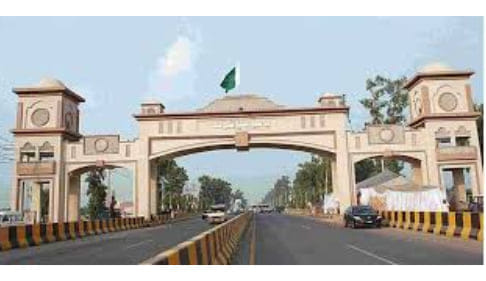
Excerpts from the unpublished book that also traces the origin of Baloch Regiment, which the author served as a soldier of Pakistan Army
Col ® Hassan Imam
Many British colonial officers from civil administration and military paid visits to Ratodero town of northern Sindh and thanked Wadero Ghulam Kadir Dayo for his all-out support in maintaining peace and security. In the area.
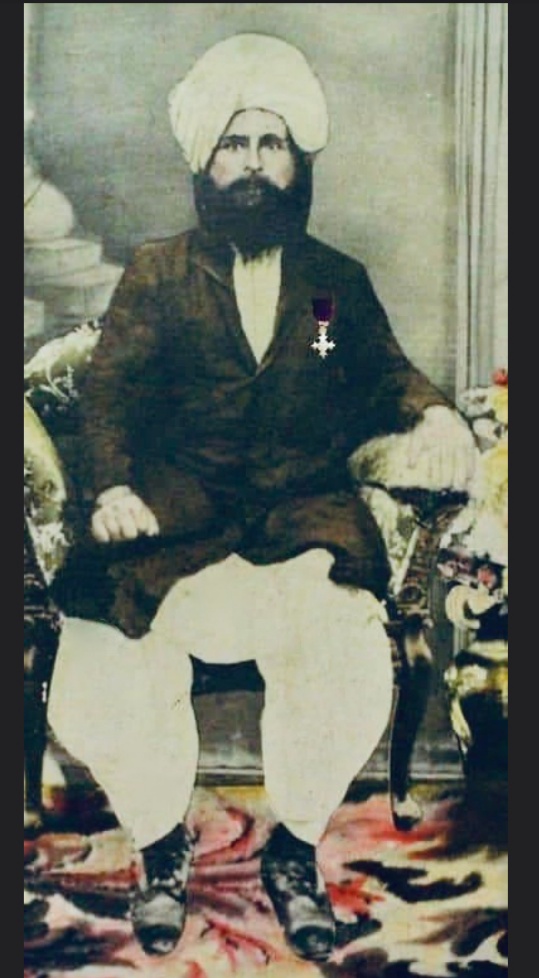
Among them who are recognized, and the descendants of Wadero Ghulam Kadir have the appreciation letters, include Colonel Alfred Hercules Mayhew Collector Shikarpur, Horace Charles Collector Shikarpur and later Commissioner in Sindh, Mules, Robert Giles Commissioner in Sindh, Arthur Delaval Younghusband, William Henry Lucas, CM Baker, JW Smith, EJ Bolus, JR Martin, Walter Frank Hudson, Governor Bombay Presidency Lord Willingdon, George Lloyd and many.
I would mainly focus on Colonel Mayhew who was Collector of Shikarpur (1896-97).
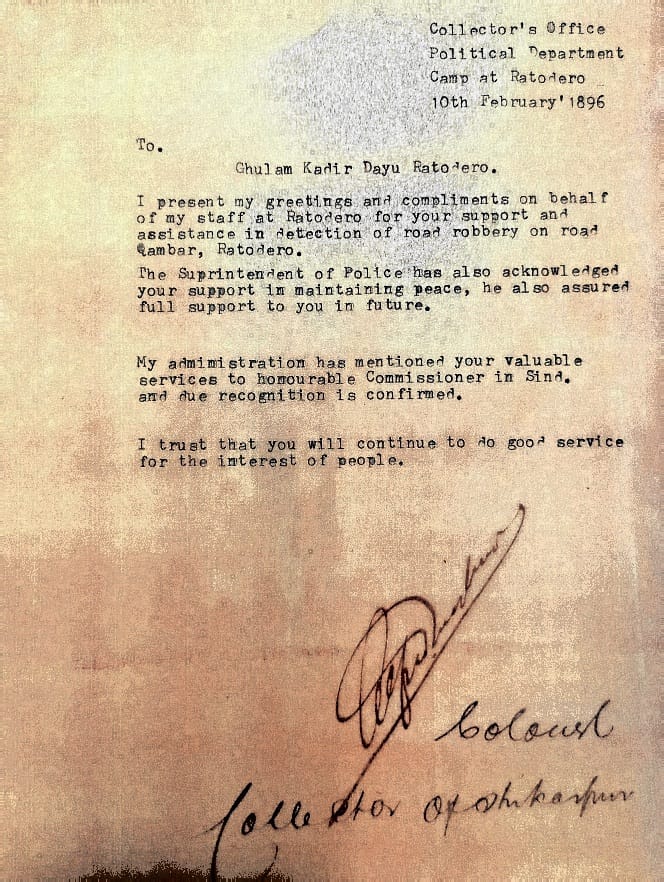 In 1847 British Government created a new district named Upper Sind Frontier District. Then the Shikarpur city was the District Headquarters till 1883 until the British Government shifted District Headquarters to Sukkur. At that time Shikarpur had 14 talukas which covered the area of all North Sindh except Khairpur.
In 1847 British Government created a new district named Upper Sind Frontier District. Then the Shikarpur city was the District Headquarters till 1883 until the British Government shifted District Headquarters to Sukkur. At that time Shikarpur had 14 talukas which covered the area of all North Sindh except Khairpur.
Colonel Alfred Hercules Mayhew was a well-known British Military Officer of Bombay Staff Corps, who also served as field officer/ Company Commander in Madras Native Infantry.
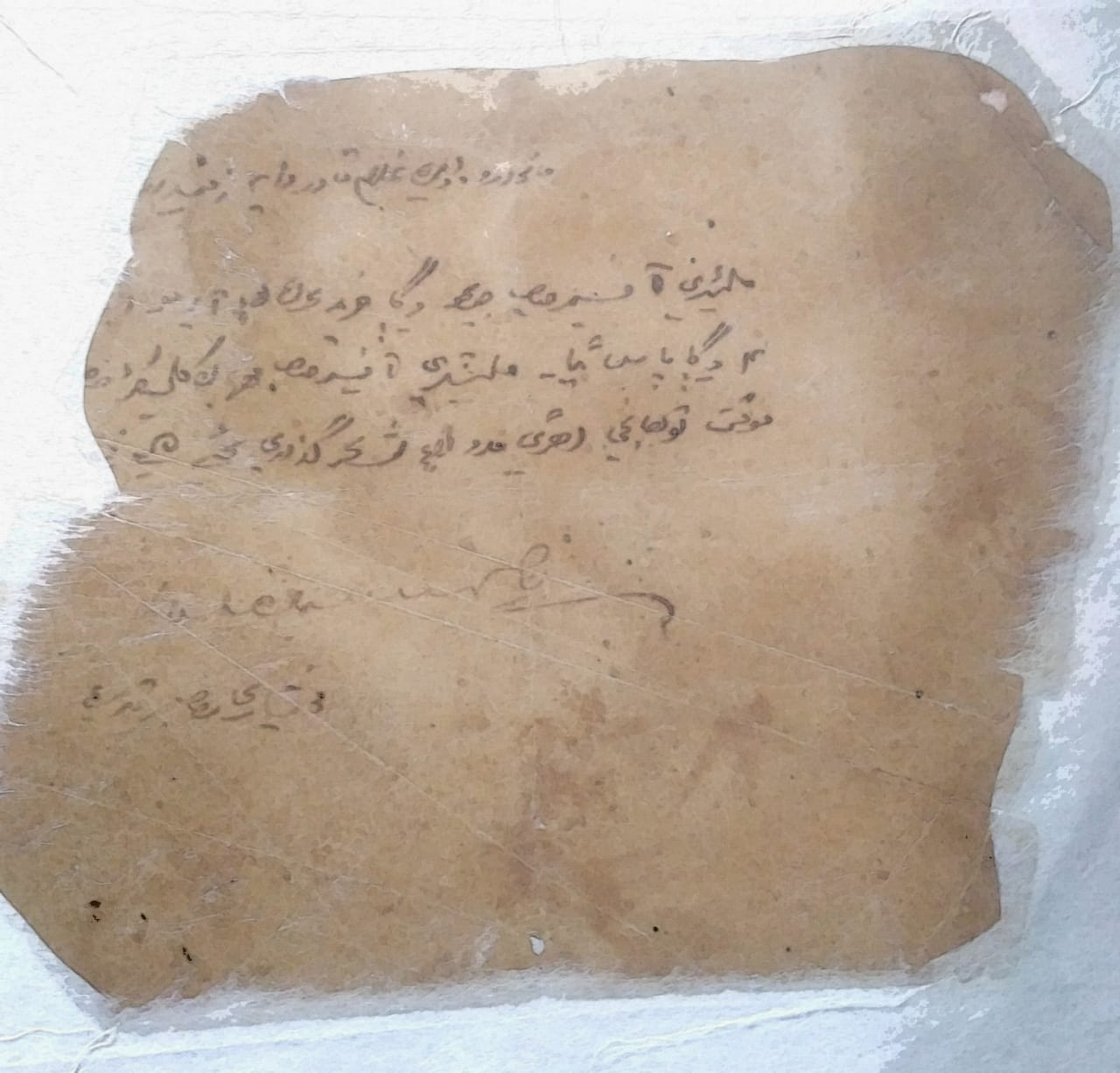 I being the Infantry soldier was interested in our Battalion history, as every young officer will always take keen interest in his unit history, being part of Military culture. Mayhew’s name was not glaring until and unless I read the Book Zulfi Bhutto of Pakistan by Stanley Wolpert. What a coincident, the area which Wolpert refers is birth place of my father and his forefathers.
I being the Infantry soldier was interested in our Battalion history, as every young officer will always take keen interest in his unit history, being part of Military culture. Mayhew’s name was not glaring until and unless I read the Book Zulfi Bhutto of Pakistan by Stanley Wolpert. What a coincident, the area which Wolpert refers is birth place of my father and his forefathers.
Ratodero is to me like anything being native place of my beloved father who was my best friend. When I read that Mayhew is from Madras Battalion, I started searching him in my unit history. My unit 5 Baloch Regiment, an outstanding outfit of Pakistan army, carries a rich heritage in itself. It is almost three centuries old Battalion. It is also called 17th Madras Battalion / or Madras Native infantry.
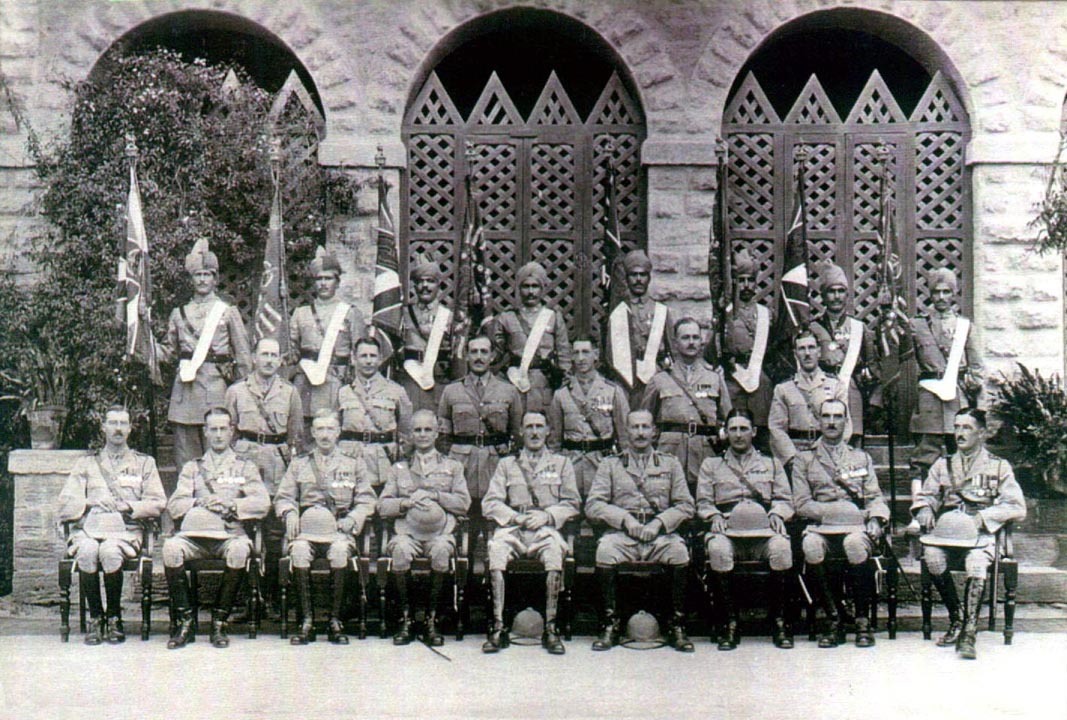
Alfred Mayhew retired as colonel, and here I also carry the same feelings after my retirement. The only difference is of time and opportunities, as he was sent to civil services. Unit association is the strongest relation in Military services. It is one family under one flag (My Unit is My Pride). Only those can understand who have the experience of what a military unit culture is? How important and strong relation it is.
Mayhew was later inducted in Indian / Imperial Civil Services through Indian Political Services Cadre. Military and other forces personnel were sent to civil services with 50% quota in those days. They never appeared in written examination like fresh civil services officers. {Likewise, Lieutenant Ghazanfar Ali Isani of Sindh was inducted in Police Services as Assistant Superintendent of Police in 1946 from Royal Navy}.
The India office record shows that Alfred Hercules Mayhew was commissioned in Bombay staff corps. He was inducted on 8th June 1861 and was confirmed on 23 May 1865 as Lieutenant; promoted as Captain on 8 June 1873, Major on 8 June 1881 and Lt Colonel on 8 June 1887. (Reference page 56 Lieutenant Colonels India office London Gazette 1887). He also served as Political Agent State of Khairpur Mir’s, Assistant Political Superintendent Thar Parker, Deputy Commissioner Jacobabad and Collector Shikarpur.
In certain articles I found a reference Investigative journalist Mick Hamer’s book “A Most Deliberate Swindle” that contains a closer look at the career of Alfred Mayhew and reveals a penchant for fighting injustice. Investigative journalist Mick Hamer, quotes Mayhew: “I served twenty seven years in India, which I found to be a pretty bad place… But when I returned to London, I found it to be a sink of inequity – and I determined to do all I could to expose… the rascals who rob the widow and the orphan.”
According to the India Office List 1893, Mayhew, during his 40-year-stint in India, served as the Deputy Commissioner of the Upper Sindh Frontier district, Political Agent Princely state Khairpur, Acting Political Superintendent in Thar and Parker and as a soldier in the Madras Army, prior to becoming collector of Shikarpur district. Among locals he had a reputation for being a fair official who interacted closely with serfs, laborers and shepherds to inquire about their problems, according to Pir Ali Muhammad Rashdi’s biographical encyclopedia ‘Uhay Deehan Uhay Sheehan’. Rashidi credits Mayhew with playing an important role in the development of Sukkur as the economic hub of Upper Sindh. (If we critically analyze Mayhew’s statement quoted by Investigative journalist Mick Hamer, it is essential to find who was widow and who was orphan whom the justice was being provided by Mayhew? This is a question to coming generations.
There are many enthralling stories between Murtaza Bhutto and Mayhew we heard and read
Before tracing the origin and history of Baloch Regiment and its officers, I would like to discuss the myth of Bhuttos.
There are many enthralling stories between Murtaza Bhutto and Mayhew we heard and read. The ice breaker is Stanley Wolpert who has referred it from unpublished memoirs of Sir Shahnawaz Bhutto. I asked former Inspector General Aftab Nabi (who has carried out research on crime in Colonial Sindh and author of Book “Defying the Colonial Rule”), what did you find between Mayhew and Murtaza Bhutto? Mr. Nabi replied, “I found nothing, it looks hypothetical story and myth, which is far away from reality”.
Another research fellow Ali Bhutto, son of Mumtaz Ali Bhutto, also have contributed his articles on Mayhew and Murtaza Bhutto and he argues that {Based on evidence collected in the investigation) Wadero Ghulam Murtaza Bhutto was accused of instigating the murder of the Mukhtiarkar – the highest authority in the taluka. In her autobiography ‘Daughter of the East’, Benazir Bhutto recalls the mythologized tale of her great-grandfather as told by her father. It suggested that Mayhew had a grudge against Murtaza BHutto, the basis of which was an affair the latter had with a British woman.
In Zulfi Bhutto of Pakistan, Stanley Wolpert, who consulted Sir Shahnawaz Bhutto’s unpublished memoirs, dismisses this as an “amended” version of the story told by Sir Shahnawaz (who was 11 years old when his father, Ghulam Murtaza died). According to his version, the young wadero had stolen Mayhew’s Sindhi mistress.
Fatima Bhutto’s memoir ‘Songs of Blood and Sword’, meanwhile, provides a largely inaccurate account of the family’s ancestral history (it also claims that the phrase ‘Mitho jo Mukam’ is a person’s name and that the Beghari Canal was named after a place). According to her, Ghulam Murtaza “was having an affair with the white wife of a British emissary.” Neither of these versions mentions that the wadero was accused of abetting the murder of Rao Jeramdas. Wolpert fleetingly cites “the Hindu… who was murdered,” as a mere afterthought – selectively quoting from Sir Shahnawaz’s memoirs.
David Cheesman, who does refer to the details of the episode in his work ‘Landlord Power and Rural Indebtedness in Colonial Sindh’, argues that Wolpert’s version is more plausible than Benazir’s.
If we go through the allegations on Mayhew and his wife, looks vague and invaluable. As I understand Christianity, religion does not allow you to have two wives at one time and the act is considered as adultery
The likelihood of a Sindhi – or any – mistress being at the center of the episode also comes into question. Ali Bhutto argues that “As Collector, Mayhew was stationed in Sukkur.” If Mayhew had a mistress, she would have most likely lived in the same city. Ghulam Murtaza, meanwhile, lived in a different taluka – a significant distance away even by train. In Sir Shahnawaz’s version of events, Murtaza got into a physical altercation with Mayhew during which the colonel went and hid under a table. This would have been highly uncharacteristic of a trained soldier who had served in the Madras army and who at the time of the alleged confrontation would have been in his early-to-mid fifties (Mayhew died in 1913, aged 70).There is nothing in the official record about what happened next. All we have is Wolpert’s version, based on Sir Shahnawaz’s memoir, according to which, at some point – possibly after being granted bail – Ghulam Murtaza went into exile, while the colonel had his home annihilated. His father, Khuda Bux, died after being “ambushed,” and when Murtaza returned to Garhi Khuda Bux in 1899 after being acquitted, he died of poisoning.
If we go through the allegations on Mayhew and his wife, looks vague and invaluable. As I understand Christianity, religion does not allow you to have two wives at one time and the act is considered as adultery. If we say that the other lady was a “Sindhi local Woman” then narrators must give her identity and identity of her tribe, family and her native place. Suppose if it happened in that time, I argue that it must have been a breaking news and leading story of London’s main stream media. The media also had a great power in those days. Just over fifty years before Mayhew the media criticized Napier’s betrayal against Mir’s and attacking Sind in 1843. About Murtaza and Mayhew the local narrations are different, Murtaza was caught in theft case. Moreover, boarding of Murtaza from Nao Dero is not justified because in those days Nao dero was not even a train halt, whereas Nao Dero became train stop very late in 1937. Ali Bhutto has argued logically with calculated distance and more convincing that “Collector’s residence was at Sukkur and not Ratodero or Shikarpur” Further, Ali Bhutto also confirms that “Blue Book” is also destroyed with some intentions. Blue Book of Larkana, Shikarpur and Jacobabad are missing and not in original shape. These were destroyed in 1974 when ZA Bhutto was Prime Minister.
Owen Bennett-Jones in his book “Bhutto Dynasty” while mentioning about Col Alfred Hercules Mayhew quoted that “in 1901, Mayhew retired and went back to London. Mayhew wrote to secretary of state at India office Lord George Hamilton, complaining that the Governor of Bombay ‘prostituted’ himself by awarding one of the Bhutto – Doda’s grandson Rasool Bux Bhutto a sword of honor in public durbar., mentioning Bhutto a notorious bad character and harbourer of thieves.
After reading much blames on Mayhew in the local history and having been gone through the profile of Mayhew, he became my interest being a unit officer of Madras infantry. Above all more inspiring for Mayhew was his letter of appreciation which Mayhew presented in person to my grandfather Ghulam Kadir for maintaining peace in Ratodero and adjacent areas, while encountering dacoits, bandits disrupting innocent people’s peace. On 10 February 1896, Collector Shikarpur Colonel Alfred Hercules Mayhew visited Ratodero all the way from Sukkur and met wadero Ghulam Kadir in Old Mukhtiarkari with other notables of the area to acknowledge his volunteer services and say thanks in recovering the Qambar -Ratodero Road Robbery 6 February 1896. (Reference Shikarpur Collector Office, political department Camp at Ratodero dated 10.02.1896). With this English officer Mayhew, who was now a civil servant, I linked three affiliations with Mayhew now, he was part of my Unit’s Military History, secondly, he honored and appreciated my grandfather and awarded him Chair of Honor (Vide 1 July 1897 District Gazette Number 14 being advisor to Collector on law and order, good governance) and lastly, he was Collector of Shikarpur and became a famous icon in Colonial History of Sind. Blaming nieghbors and others killing Bhutto’s grandfather is far away from reality. Narrations says that it was battle of heirship in between two branches of Bhutto family, resultantly Doda Bhutto had to expel Khuda Bakhsh from his haveli. Even after a century, today’s incidents which we observed in confrontation between Shahnawaz Bhutto and his brother Murtaza Bhutto was not political but share in heirship as mentioned by Zulfiqar Bhutto’s friend and former Diplomat Jamshed Marker. “A tale without an end” in the spring of 2010, Jamshed Marker tossed diplomatic caution to the winds and decided to tell the truth by Anjum Niaz, published in Express Tribune on July 01, year 2018. Now the macabre part. I reproduce the following text verbatim in my column printed way back in 2010 in an English-language newspaper. I never got a rebuttal from the Bhutto family. “Begum Nusrat Bhutto lived in Cannes, in the French Riviera. The lodgings were loaned to her by the then French Minister of justice. The minister was a good friend of the Bhuttos as was President Gaddafi of Libya. Gaddafi had given large sums of money to the Bhuttos. One evening during dinner in a restaurant, the two boys — Murtaza and Shahnawaz — entered into an argument over the division of the money.
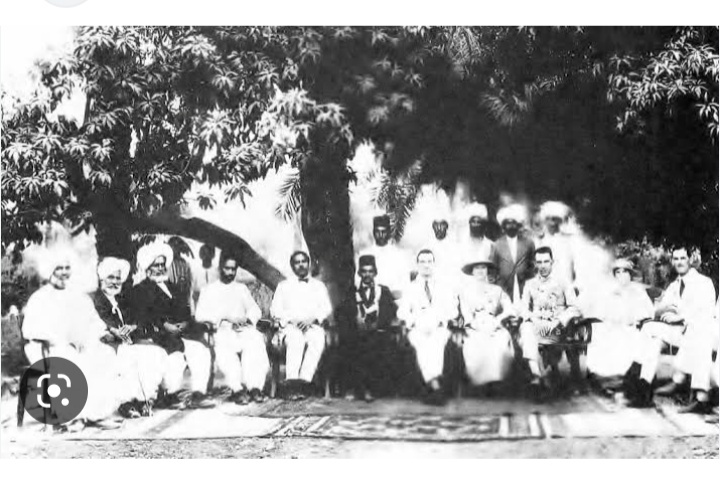
“Benazir tried to calm them down but she didn’t succeed,” remembers Marker. In the end she took her mother and sister back to their home, while Murtaza followed Shahnawaz to his flat. The fight turned ugly. At some point the French police came to arrest the inmates. By that time Shahnawaz was unconscious. He had taken an overdose of drugs. The police could not arrest Murtaza because he had a Syrian diplomatic passport. Later that night the younger brother passed away. The police arrested his Afghan wife for “not coming to the aid of a dying man.” She hired a lawyer but the case was quashed by the bereaved family when she threatened to spill the beans.
“The whole affair was so sordid; so grim; so grisly,” says Marker who was given all the details by the head of the French intelligence police. But General Naseerullah Babar, who was later Benazir’s interior minister, claims that General Zia had a hand in the murder. He had sent a death squad to eliminate the younger son. Babar says Shahnawaz was poisoned, I ask Marker “No, that’s not true at all. Zia had nothing to do with it.”
While we know that Shahnawaz died of an overdose of pills, we still don’t know what happened to the millions of dollars gifted by Libyan dictator Gaddafi to the Bhutto family and more importantly which of the siblings got the lion’s share.
We go further and find Fatima Bhutto, Blaming on former president Mr. Asif Ali Zardari, husband of Mohtarma Benazir Bhutto for plotting Murtaza Bhutto’s murder, whereas the different sources reported that Murtaza was proclaimed by sensitive organizations and he was like “Thumb on Neck”, as he was confronting Drugs lords and they took the advantage of situation and planned Murtaza’s murder. Though the political confrontation and command and control of the Zulfiqar Ali Bhutto’s party was a Tug of War between Brother and Sister, to this Murtaza mentioned in a Television interview and placed on YouTube. This interview was given in presence of Begum Nusrat Bhutto and Ghanwa Bhutto, and daughter Fatima and Zulfiqar junior were also sitting during the interview. Moreover, to clarify further this was also augmented by Begum Nusrat Bhutto, who maintained that “Murtaza wants that his father’s party to flourish cleaned from all odds and corruption free affairs.
Back to Mayhew
Collector Shikarpur Colonel Alfred Hercules Mayhew was a dedicated person who always looked after the welfare of locals and inspired them to rise and shine and stand shoulder to shoulder with Raj. Mayhew after many incidents which wadero Ghulam Kadir supported in ensuring peace inspired Mayhew and Mathew was the first one who advised Dayo to educate his generations with modern English system of British Raj and bring his people to main stream, send them to armed forces and other public services. “This will bring much prosperity and shall give your people great recognition. Sindh is yours and you people have right to serve your people. Provide them quality education and bring innovation in people’s thinking. There is much fallen and bravery I can see in the region. You are equally competent like English people,” Mayhew had said.
The Advice of Mayhew colossally worked and Ghulam Kadir invested his energy in education in family and tribe, which proved after some time when his own family members were inducted in Prime Public services. (Continues)
____________________
 Colonel ® Hassan Imam is the former Head, Inter Services Public Relations (ISPR) Karachi Sindh.
Colonel ® Hassan Imam is the former Head, Inter Services Public Relations (ISPR) Karachi Sindh.
agha.sajid17@gmail.com
[…] The 2nd part mainly focused the history of Burma Battalion. It would be advisable to click on Part-I and Part-II and read it for a better understanding of the series. – Nasir Aijaz, Editor Sindh […]